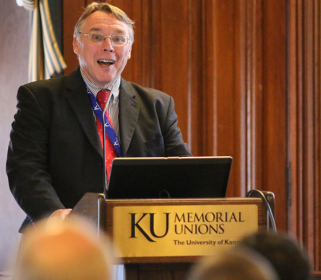OCR expertise on science practicals recognised at international assessment event
30 October 2015
Neil Wade, OCR's Subject Specialist for Science, recently presented our 'positive about practical' approach to Practical Science Assessment at the International Association for Educational Assessment 41st annual conference in Kansas.
 Neil wrote the paper, ‘Validity Issues in the Reform of Practical Science Assessment’ in collaboration with Ian Abrahams, Head of the School of Education and Professor of Science Education at the University of Lincoln. Professor Abrahams jointly authored the papers which first coined the terms ‘DAPs’ (Direct Assessment of Practical Skills) and ‘IAPs’ (Indirect Assessment of Practical Skills), which underpin the philosophy of the Practical Endorsement.
Neil wrote the paper, ‘Validity Issues in the Reform of Practical Science Assessment’ in collaboration with Ian Abrahams, Head of the School of Education and Professor of Science Education at the University of Lincoln. Professor Abrahams jointly authored the papers which first coined the terms ‘DAPs’ (Direct Assessment of Practical Skills) and ‘IAPs’ (Indirect Assessment of Practical Skills), which underpin the philosophy of the Practical Endorsement.
Their paper provided an international audience of leaders in education with a case study of OCR’s response to the reform of practical science assessment at A Level – which is inextricably linked to the concept of direct assessment of practical skills.
The presentation showed how OCR’s Practical Endorsement model integrates assessment into the teaching and learning of science, freeing teachers to choose practical work to suit their students, facilities, technician support and lesson length. Neil explains: “In essence, the new model appreciates that practical activities and assessment are part of education, integrated to teaching and learning science, and not something that is done separately.”
OCR has consistently argued that the 'positive about practical' approach means A Level students will do more experiments that really help them to learn science - and crucially - in ways that really work for teachers too. Feedback from teachers already suggests that this is proving true:
“The new A level is proving to be very good to teach, it’s different, but I can’t put my finger on why. Comparing it with the old A level which is running alongside it for A2, the new course is about improving practical skills, not just stopping teaching to do the practical assessments. The practical work now is not different and separate from the teaching, it just fits in really nicely when we are doing the work.
Part of it is that you don’t have the jeopardy of passing or failing on a particular day. It seems more relevant and not contrived. It is applied to the topic being studied and makes the students think about what they are studying.”
Penny Judge, Physics Teacher, Morehouse School
“I am so excited about the introduction of the practical endorsement. In my opinion it raises the profile of practical in A Level, makes it integral to the learning and moves away from the hoop jumping we have seen in previous years.
I am also grateful for the massive amount of support given to us by OCR to implement the practical endorsement. The practical sheets, the PAG tracker and the thorough training have made it easy for us to move seamlessly to the new system.
I have been teaching Science for 16 years and in my opinion the practical endorsement is the most sensible change that has happened.”
Rebecca Connick, Head of Biology, Nottingham Girls High School
Find out more
There are a number of ways to learn more about OCR’s Practical Endorsement, and to access support from our team of Subject Specialists:
• Take a look at our Practical Endorsement summary guide.
• View a series of short films from our Subject Specialists on the Practical Endorsement and how it works.
• Book in for one of our CPD training events on Managing the Practical Endorsement (for lead teachers)
• Questions? Contact OCR’s Practical Activity Support Service: PositiveAbout.Practical@ocr.org.uk
• Keep up to date with all the latest from the OCR Science team on Twitter: @OCR_Science